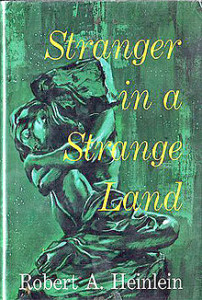17 November 2016 – Sometimes I actually take a break from reading about and writing about politics or technology, and just scan my entertainment media “INBOX” (a special email account set-up by my brilliant CTO that seems to collect almost everything across the entertainment ecosystem).
Entertainment Weekly reports that Paramount TV and Universal Cable Productions are teaming up to develop Robert Heinlein’s classic “Stranger in a Strange Land” into a TV series on Syfy. It is the first science fiction book I ever read. It hooked me on the genre.
The novel takes its title from the scriptural verse Exodus 2:22 and Moses’s reflections on fleeing Egypt and producing a son with his wife Zipporah:
“For he said, I have been a stranger in a strange land.”
There is a very good, very thorough analysis of the book on Wikipedia (click here) but in brief:
The 1961 sci-fi book is set in the aftermath of a third world war. Humankind sends its first human expedition to Mars. The spaceship’s crew arrives on the planet and are never heard from again. Twenty-five years later, another mission is sent, and the child of two of the first ship’s crew members, who has been born on Mars and raised by the peculiar Martian race, is discovered and brought back to Earth. Because of various legal precedents, Valentine Michael Smith, the Man from Mars, is the inheritor to a vast fortune, and because of another precedent known as the Larkin Decision, “Michael” has a claim to legal ownership of the planet Mars. Therefore he has the potential to be massively influential in matters of Earth politics, and he is kept under close guard at a hospital by the leader of Earth’s government, Secretary General Joseph Douglas. In the hospital, Mike slowly teaches his body to adapt to the Earth’s atmosphere and he begins learning Earth culture and language, which differ enormously from Martian ways of thought.
Heinlein has great fun pointing out human oddities and foibles as Michael tries to “grok” the world around him. “Grok” entered the U.S. vocabulary, meaning “to understand intuitively or by empathy, to establish rapport with” and “to empathize or communicate sympathetically with”. He creates an enjoyably nasty future world governed by backroom deals, black propaganda, and (decades before Nancy Reagan) the astrological obsession of the wife of the nominal head of state. There are plenty of tense moments as Michael and the people who befriend him escape and outwit various “security” goons and there’s plenty of intrigue as a political case is put forward for his survival. Sure, there are hints of things to come in the form of busty nurses and beautiful secretaries frolicking in swimming pools, but this part of the book is relatively straight.
The true driving forces of the novel are religion and sex which Heinlein’s publisher at the time wanted him to cut out. But in a Guardian article about the book the author noted to his literary agent that if religion and sex were removed from the text, what remained would be the equivalent of a “nonalcoholic martini.”
NBCUniversal Cable Entertainment Chairman Bonnie Hammer, who has a hand in the series, said:
“From my point of view, Stranger in a Strange Land isn’t just a science fiction masterpiece. It also happens to be one of my favorite books ever! The story is timeless and resonates more than ever in today’s world. As a fan, I can’t wait to see it come to life as a world-class television event.”
Spot on. The sociopolitical allegory is now recognized as a landmark of American literature. The Wikipedia link I noted above mentions that in 2012 the U.S. Library of Congress named it one of 88 “Books that Shaped America”. It was the very first science-fiction book to make the hallowed “New York Times Best Sellers list.
The Wiki article does a very nice job putting the book in perspective and gives you far more information than you probably need. What is not noted in the Wikipedia article is that the initial draft that Heinlein turned in to his publisher tipped the scales at a whopping 220,000 words and 800 pages, far too long for the publisher’s tastes. So a deal was made: Heinlein was permitted to keep the sexual and religious content, but he agreed to cut over a quarter of the length.
